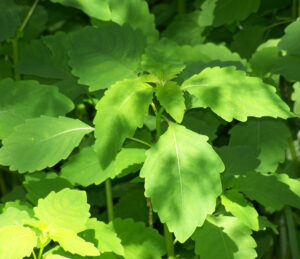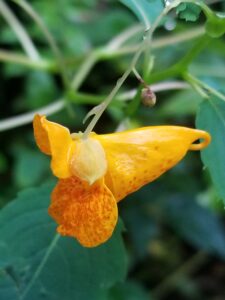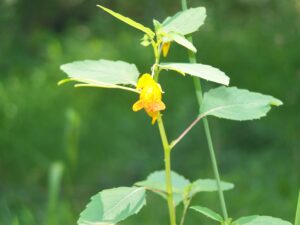Get to Know Jewelweed for Summer Itch Relief!

Summertime is a favorite season for many people, more time outdoors, summer vacations, and parties all make for lots of fun and relaxing days but with the sweets come the sour. More time outside means more biting insects and potentially Poison Ivy rash for those outdoor enthusiasts prone to reaction to this abundant plant. Around 85% of the population will experience an allergic reaction to the oily plant compound called urushiol that is found in varying concentrations in plants in the Anacardiaceae or Cashew Family. Members of the Cashew Family include Poison Ivy (Toxicodendron radicans), Poison Oak (Toxicodendron diversilobum), Poison Sumac (Toxicodendron vernix), Cashews (Anacardium occidental), and Mangos (Mangifera indica). The urushiol compound is an oleoresin contained within the sap of these plants that is released when the plant is bumped, bruised, or cut and can seep into the dermis of the skin upon contact causing the dreaded Poison Ivy Rash!
 Enter Jewelweed! One of the best remedies I know of to combat this summertime trickster. Jewelweed (Impatiens capensis) is an annual member of the Balsaminaceae or Touch-Me-Not Family. In fact, one of Jewelweed’s common names is “touch-me-not” due to the spring like action of the seed pods when touched that will send seeds flying in all directions much to the delight of children and young at heart adults. Jewelweed grows in areas with good water sources, close to streams, ponds, and flood plains. It grows to heights of 3 to 5 feet with serrated, oval shaped leaves appearing opposite lower on the stem and alternate towards the top. The stems have large leaf nodes where much of the juicy anti itching compounds reside. Depending upon where the plant is located, you will find the irregular orange or yellow flowers any time between June and September. The active parts of the plant are the leaves, stems, and nodes that are best used before the plant flowers.
Enter Jewelweed! One of the best remedies I know of to combat this summertime trickster. Jewelweed (Impatiens capensis) is an annual member of the Balsaminaceae or Touch-Me-Not Family. In fact, one of Jewelweed’s common names is “touch-me-not” due to the spring like action of the seed pods when touched that will send seeds flying in all directions much to the delight of children and young at heart adults. Jewelweed grows in areas with good water sources, close to streams, ponds, and flood plains. It grows to heights of 3 to 5 feet with serrated, oval shaped leaves appearing opposite lower on the stem and alternate towards the top. The stems have large leaf nodes where much of the juicy anti itching compounds reside. Depending upon where the plant is located, you will find the irregular orange or yellow flowers any time between June and September. The active parts of the plant are the leaves, stems, and nodes that are best used before the plant flowers.
To use Jewelweed to stop the itch from Poison Ivy rash, other skin irritations, or mosquito bites, you can make a poultice with the leaves and juicy stems or blend up the aerial part of the plant in a blender with a little water, straining out the plant material then freezing the remaining liquid in ice cube tray so that you will have them when you need them. Jewelweed can be made into a salve, or you can purchase a Jewelweed Salve from the Green Girl Shop online. You can even use Jewelweed as a Poison Ivy rash preventative. If you happen to brush up against the plant and can find a fresh Jewelweed plant, simply break off some of the succulent stem rubbing the Jewelweed juice over the area that has come in contact with the Poison Ivy plant. You can use Jewelweed Salve in the same way and soap and cold or cool water, and a washcloth can also help to break down the plant oils.

Jewelweed has other medicinal uses beyond calming plant rashes and taking the itch out of mosquito bites. You may be surprised to learn that Jewelweed contains 2 compounds, 2-methoxy-1 and 4-napthoquinine that can be used to shrink and calm the discomfort of hemorrhoids and is used topically for fungal conditions such as athlete’s foot rash, ringworm, and dandruff. The Ojibway tribe would use the plant juice spread along the forehead to calm headache pain, for Poison Ivy rash, and hives. Although the young tender leaves can be boiled and eaten, it is not recommended to be taken internally very often due to the high selenium and calcium oxalate levels.
If you’d like to learn more about the healing plants growing all around us, be sure to check out the Classes tab for upcoming classes and sign up for the Green Girl email list!


